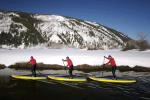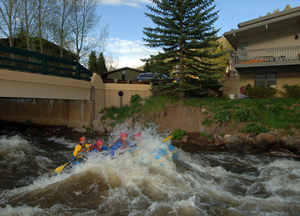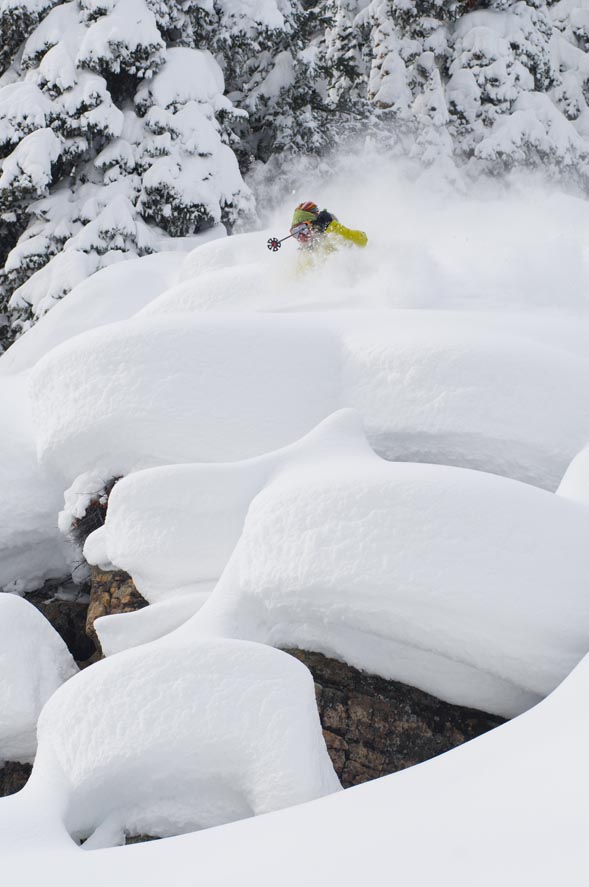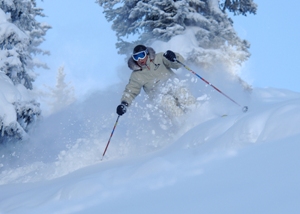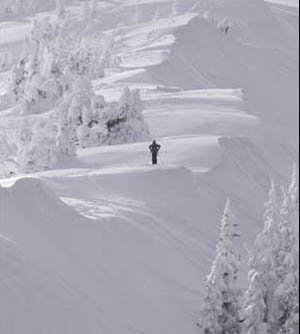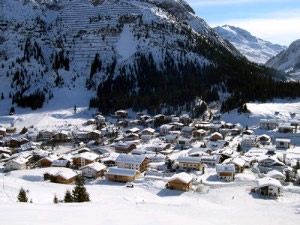
Courtesy of Brian Sipes
Vail, Avon biomass plants may be best way to battle beetle kill, generate renewable energy
February 26, 2009 —
Biomass mania has hit the Vail Valley – or at least it should be – as both a Vail councilman (Mark Gordon) and Avon councilman (Brian Sipes) have revived the idea of building wood gasification power plants that would use extremely high heats to consume woods chips to generate hot-water heat for hotels, public buildings and even homes.
A similar plant provides 90 percent of the heat to the hotels and lodges of Lech, Austria, sister resort of Beaver Creek, and Vail and Beaver Creek officials have toyed with the idea of adopting the technology here for years. It makes even more sense in the Vail Valley, which is surrounded by millions of acres of dead or dying lodgepole pines hit by a mountain pine beetle epidemic.
Austria farms its forests to manage the renewable resource, making a biomass plant virtually carbon neutral. All the dead trees surrounding Vail and Beaver Creek will release their carbon dioxide one way or another – either when they fall down and rot or go up in flames.
Now with more than $130 million in stimulus funds coming Colorado’s way for new-energy projects (although most of it will go toward weatherizing low-income homes), there are funds that may be available for innovative projects that both reduce the fuel load for wildfires and provide alternative, renewable energy.
Anyone who thinks a biomass plant is an idea worth exploring should contact the two councilmen and urge them to make the process public and start chasing public funds. Check out my stories in both Real News and Real Biz (a similar plant just cranked up at Middlebury College in Vermont), and let’s start generating support for a very practical solution to beetle kill mitigation and renewable energy needs.
In other political news, SB 108, the so-called FASTER plan to fund road and bridge repairs, is just a couple of minor procedural steps from hitting Gov. Bill Ritter’s desk for a signature after the state House of Representatives passed it 34-31 on final reading Wednesday.
Introduced by Dan Gibbs (D-Silverthorne) in the Senate and Rep. Joe Rice (D-Littleton) in the House, FASTER raises vehicle registration fees for most cars and trucks by $32 the first year, up to $41 after three years. It will raise more than $250 million a year to repair roads and fix the state’s 126 structurally deficient bridges.
Much like the debate in the Senate, Republicans once again tried to throw up a roadblock to keep FASTER from becoming a reality, claiming it’s another financial hardship in tough economic times. But Democrats countered it’s the first new funding for road and bridge repairs in 17 years. The last time was when the state’s gas tax was increased.
“Nobody disagrees that there’s a problem safety-wise, nobody disagrees that we want to try and save private sector construction jobs, the question is what do you do about it, and of course it’s a natural reaction, everybody first wants to do something that’s not painful and doesn’t require new fees,” Rice said.
Every House Republican and four Democrats, including Majority Leader Paul Weissmann (D-Louisville), voted against FASTER. Rice said that because TABOR won’t allow the state Legislature to increase taxes to fund transportation, a fee hike was the only recourse.
“We’re in this boat because the gas tax has been declining for 17 years,” Rice said. “People are paying less than they did the year before, and most people understand the only real way to fix it is we have to bring in some new money to transportation. And frankly the cost of doing nothing is more expensive. It may be more indirect, but it’s more expensive.”
There was more debate about a provision that would allow local jurisdictions to impose tolls on existing roads, but ultimately it stayed in because Democrats argued it gave one more potential tool to local governments. Again, see previous stories in Real News.
![]() 5 Comments on "Vail, Avon biomass plants may be best way to battle beetle kill, generate renewable energy "
5 Comments on "Vail, Avon biomass plants may be best way to battle beetle kill, generate renewable energy "
Duane Short — February 26, 2009
Stripping Vail's forests of beetle-killed trees will do nothing... let me repeat, "nothing" to stop or slow beetle kill. This idea is being used to gain support for logging dead trees. Dead trees are not dead wood. Forests need dead trees to replenish the soil with nutrients, protect the watershed from excessive runoff and erosion, and to help retain moisture in and just above the soil surface.
Downed trees serve to naturally "mat" the forest floor in ways similar to straw or other mats used by road construction crews to protect steep sloped highway right-of-ways.
Nature, will better mitigate beetle-kill than tree farming but only if we allow it.
Rotting logs release CO2 slowly. Burning releases CO2 rapidly.. whether burned on the forest floor or in your wood stove.
In the meantime wildlife and watersheds suffer when the forest is farmed and groomed as done in Austria. If you just don't like wildlife I'm wasting my words.
Reid — February 26, 2009
Great points from both sides. For Gordon and Sipes, not only do you show the state that we want to be environmentally pro-active, and people will be needed to forest these trees thus increasing jobs, which is a great thing for this valley right now. However, Mr. Short is right about fallen trees matting forest floors, and hunting and camping in these areas will be greatly impacted. Not to mention mudslides and erosion. It will be interesting to see how this issue pans out. As a weather watcher I'm still waiting for that dreadful August lightning strike to finish the job.
David O. — February 26, 2009
The biomass solution is not intended to end the beetle-kill epidemic but rather to mitigate the wildfire danger. The beetles have already won the war, but a massive forest fire would result in a scorched landscape largely incapable of supporting wildlife and far more susceptible to erosion. Already new trees are coming up, so selectively thinning certain areas near towns and ski resorts, removing large stands of dead trees, would provide defensible space for firefighters and a source of wood chips for biomass hot-water and electricity production.
Brett Taylor — February 27, 2009
The bark beetle problem can only become worse over time. A renewable energy group called Biotenpower.com in Tennessee has come up with the best developed technology for solving both the energy problem and our infestation and mistletoe problems. They seem to have the least emissions from any power generating system in the world. Their technology was developed by the US Department of Energy and uses sawdust, bark, branches and even municipal bio solids. Several cities are lining up to order these 10-22 MW power plants and the best part is they are carbon-neutral and use no water.Waugh
David O. — February 27, 2009
Interesting input, Brett. I'm wondering how this technology differs from the wood gasification plant in Lech, Austria. Is it cleaner burning? Is it cheaper up front? I'll look into the group you reference, because there is a virtually limitless supply of dead wood surrounding Vail and Beaver Creek, and simply allowing it to burn naturally is not an option. Pushing logging roads deep into the forest should be avoided as well, but there's a huge supply close to town, and this technology seems like a great way to get off the coal-fired grid and reduce the fuel load.





